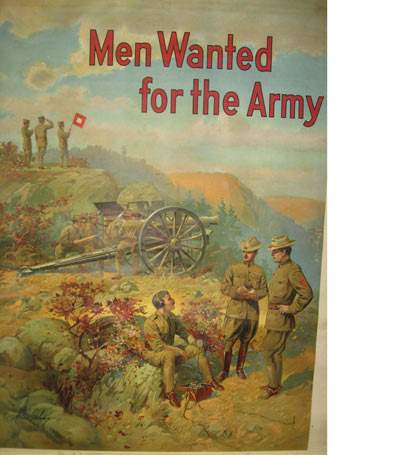WWI War train connects two Quincy men

Tucked inside the archives at Quincy University 's Brenner Library is a remarkable set of letters that show the wartime experiences of one of the Gem City's own soldiers who fought in the American Expeditionary Force in the First World War, Ernest L. Wingerter.
One letter reveals a far-away-time connection between Wingerter and another Quincy soldier, Henry R. Hill.
On June 28, 1914, Franz Ferdinand, Archduke of Austria-Hungary, was assassinated in Sarajevo, the Balkan capital of the provinces of Bosnia and Herzegovina. The conflict lasted more than four years and resulted in more than 20 million deaths. Originally the war was a struggle between Europeans, but in April 1917, the United States entered the war on the side of the Allies, which included Britain, France, and Italy.
Dozens of Quincyans took part in the conflict, including Wingerter. Wingerter's thoughts never strayed far from his true love, Nora. Wingerter was first stationed in Chicago, and on July 28, 1917, he wrote from the Kelly European Hotel. "My Dear Nora," he began, "Here am I head over in workings of Uncle Sam. I have three companies here to muster and it will take me about a week to finish them up." In the meanwhile, Wingerter hoped she would come and visit him, a frequent request in his letters in 1917.
In early 1918, Wingerter and his company received orders that they were to be sent to France. Wingerter wrote to Nora on May 20, 1918: "Address me as Company B. 123rd Battalion, 33rd Division, A.E.F. c/o Post Master N.Y. He and his fellow soldiers made their way to New York on a train, where "Henry R. Hill is in command of this train and is very good to us."
The train commander to whom Wingerter referred was Brigadier Gen. Henry Root Hill, also from Quincy. Born in the Gem City in 1876, Hill joined the Illinois National Guard in 1894, rose through the ranks and was appointed brigadier general in 1914. When America went to war, Hill was dispatched to the Western Front in France. He commanded the battalion in the 128th Regiment, 33nd Division. In October 1918, Hill's battalion took part in the Meuse-Argonne Offensive. During the battle, Hill was struck down by a machine gunner. Hill was buried in Woodland Cemetery and was posthumously awarded the Distinguished Service Cross.
Wingerter and in the 123rd Machine Gun Battalion landed in France later that month and on June 3, Wingerter wrote Nora, "Just received an inspiration to write you by looking at your picture which sits upon one of the oldest French dressers in existence." On the back of the envelope is a stamp, "OPENED BY CENSOR."
Since the censors read, or could read every letter sent home, Capt. Wingerter became a little more circumspect when writing Nora. The letters became a bit more mundane, with fewer references to his love for her. What comes up time and time again is the captain being lonely, and at times almost pleading for her to write. Finally, in the later parts of the summer, Ernest received a batch of her letters, which clearly lifted his spirits.
The captain kept Nora informed of his company's progress, and his admiration and pride comes through. Writing from Belgium on Nov. 7, 1918, just two days before the Armistice was signed, he related that on Oct. 31 his "company was in the hottest part of it (a battle with the Germans) as usual ... and I am quite proud to state it was my little outfit that stopped one of Germany's counter attacks." Just two days later the captain wrote: "Please don't forget the date. I am quite well and living comfortably just at present in a nice little Belgian village where everyone both civil and military are quite jubilant! Why are they happy? I suppose it is because we are winning the war." He was correct, as two days later, Nov. 11, 1918, Germany surrendered. The "Great War" was over.
The Wingerter letters were donated to Quincy College in 1996 by the George H.W. Bush Library. David E. Alsobrook, the acting director, wrote to Father Victor Kingery, the dean of the Brenner Library, asking if Quincy University would be interested in the letters. "In a series of letters to a Miss Nora Moriarty of Quincy," Alsobrook wrote, "Captain Wingerter provided vivid descriptions of life in various Army training camps, combat on the Western Front and the challenges of the post war period. Father Kingery replied, that yes, Quincy would, and the letters today are part of the Genosky Local History Collection the Brenner Library Archives. There are more than 120 letters, along with some memorabilia that Wingerter collected from his time in the service.
As the 100th anniversary of the start of World War I approaches, is important to recall and honor the sacrifices made by men like Capt. Wingerter and Brigadier Gen. Hill, who made the ultimate sacrifice. The Wingerter letters can be seen at the Brenner Library at Quincy University. A memorial to Gen. Hill can be viewed at the Gardner Museum. The Historical Society of Quincy and Adams County houses a collection of WWI recruitment posters.
Justin P. Coffey is associate professor of history at Quincy University , where he specializes in recent American history and is the author of numerous books.






